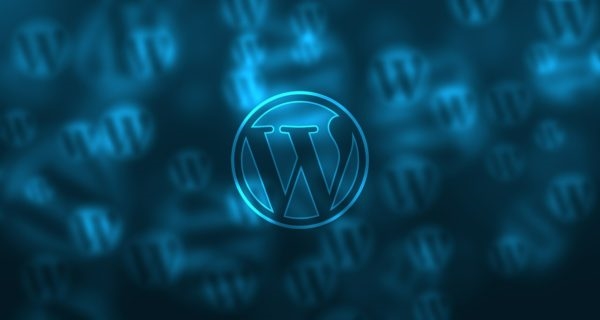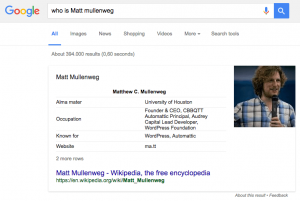— October 9, 2018

simplu27 / Pixabay
So far in this series, we’ve talked about ways to drive traffic to your site using SEO and PPC and how to use analytics to make informed decisions. At the core of all these concepts is that your small business has a website. Many do, of course, but if you haven’t set up your website and blog yet, you may be wondering where to start. (Side note: Check out Content Equals Money’s Startup Guide to Business Blogging if you need somewhere to start your business blogging journey.)
Websites can be complicated things, and the prospect of building one from the ground up when you’re not well-versed in the subject can be intimidating. Some small business owners may abandon the concept of a website for the time being because they can’t do it themselves or justify the cost of a website developer in their budget. But there is another option: WordPress.
What Is WordPress?
WordPress originated as a blogging platform, and many of its users are still doing just that. But WordPress has evolved much over the past few years, and now it’s a full-fledged content management system (CMS). This means that people can use WordPress for developing entire websites, even without any specialized knowledge.
Now, WordPress isn’t the only CMS available, and it’s not even the only option for small businesses. Some other specialized CMSs can fit specific types of businesses better, such as those developed for extensive e-commerce. Even so, WordPress is easily the most popular CMS, and it’s a great choice for small business owners.
What WordPress Can Do for You
WordPress offers two main options for users: hosted and self-hosted. The short version of what this means is that you can use the fully functional hosted version to build a quick website design for hosting content and starting out. The self-hosted version is better for users who have a little more knowledge about coding and design or when your site has grown enough to need bigger adjustments than the hosted version can give you.
If you have no idea how to build a website, the hosted version is going to be the way to go. Thanks to WordPress being open-sourced, you can start a site for free. There are upgrades that you can pay for, but it’s simple enough to build a site without needing to put any money into it.
Even so, the premium and business versions of WordPress give you a lot more storage, design, plug-ins, and domain name options. You should consider at least signing up for WordPress Premium ($ 99 per year) so that you can give your site a custom domain name without the WordPress URL attached.
Other great benefits of using WordPress are:
- WordPress completely handles the technical end of your website, so you don’t have to worry about maintenance.
- The layout is simple to learn.
- WordPress is SEO friendly.
- WordPress’s team provides constant updates to keep the CMS secure.
- There are numerous free themes available.
- Free plug-ins allow you to further customize your site functions.
- The vast WordPress community makes it simple to find support and guidance.
- WordPress sites can support multiple users at different points of access.
All these options make for a very appealing package to small business owners who want to start a website. They also give your website room to grow. At any time, you can switch from the free version of WordPress to one of the premium options. You can, of course, switch the website built on the hosted version to the self-hosted version when you’re ready to expand further.
Working With Self-Hosted WordPress
One of the downsides of hosted WordPress is that, while it’s simple to use, you can’t change any of the code that runs your website. For many business owners this is just fine, but for others this can be too restrictive. The self-hosted version is almost as simple as the hosted version, though there can be a learning curve if you’re not accustomed to handling all aspects of your site.
You still get access to themes and plugins, and being able to alter the code lets you change parts of your site you can’t even touch on the hosted version.
The biggest downside is that the WordPress team isn’t in charge of the technical aspects of your site anymore. However, for sites that have outgrown the hosted version or find it too restrictive for their purposes, self-hosted WordPress can give you flexibility over your site without having to build it from scratch.
As mentioned, there are plenty of other CMS platforms out there, but WordPress offers a simple, affordable, and customizable option for business owners who don’t want to commit an inordinate amount of time and effort to getting a functional site up and running.
Our Simple Tech for Small Business Owners series is almost complete, but there’s still one more post to go. Keep an eye out for the final post: HTML.
Series Articles
Part 1: Simple Tech for Small Business Owners, Part One: SEO
Part 2: Simple Tech for Small Business Owners, Part Two: PPC Advertising
Part 3: Simple Tech for Small Business Owners, Part 3: Google Analytics
Part 4: Simple Tech for Small Business Owners, Part Four: WordPress
Part 5: Simple Tech for Small Business Owners, Part 5: HTML
Part 6: Simple Tech for Small Business Owners, Part 6: HTTP vs HTTPS
Part 7: Simple Tech for Small Business Owners, Part 7: Video Campaigns
Part 8: Simple Tech for Small Business Owners, Part 8: CSS
Part 9: Simple Tech for Small Business Owners, Part 9: Domain Names
Part 10: Simple Tech for Small Business Owners, Part 10: How to Measure Your PPC Campaign
Originally from Business & Finance Articles on Business 2 Community
(43)







3 thoughts on “Simple Tech for Small Business Owners, Part Four: WordPress”
Comments are closed.